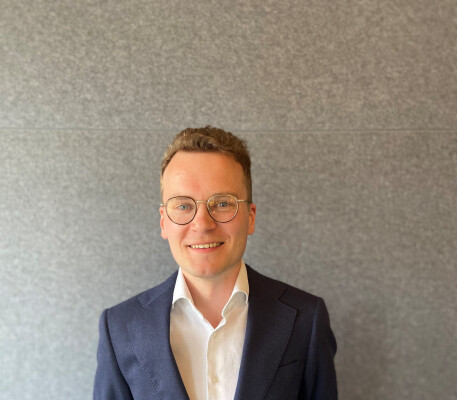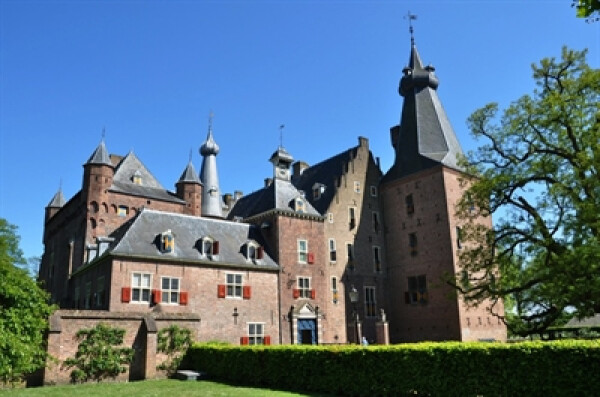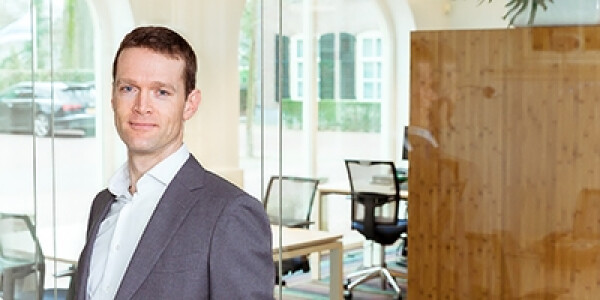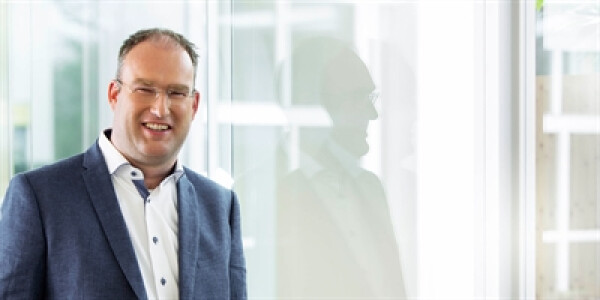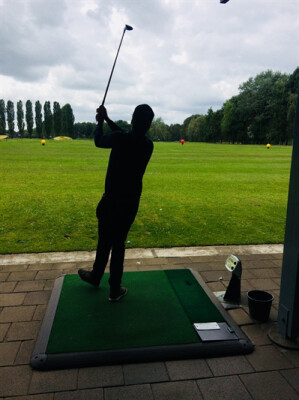News
ARV Consulting
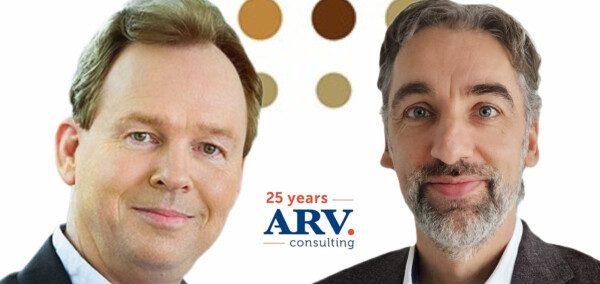
25 years of ARV Group: Jeroen & Bastiaan
Founder and youngest partner in conversation together
This year, ARV Group celebrates its 25th anniversary. To mark the occasion, a conversation with two colleagues: Jeroen Verheijen, associate partner and one of the three founders of ARV Group, and Bastiaan Boers, who joined in 2022 as the youngest partner.

25 years of ARV Group: Jeroen & Bastiaan
Founder and youngest partner in conversation together
This year, ARV Group celebrates its 25th anniversary. To mark the occasion, a conversation with two colleagues: Jeroen Verheijen, associate partner and one of the three founders of ARV Group, and Bastiaan Boers, who joined in 2022 as the youngest partner.

25 years of ARV Group: Jeroen & Bastiaan
Founder and youngest partner in conversation together
This year, ARV Group celebrates its 25th anniversary. To mark the occasion, a conversation with two colleagues: Jeroen Verheijen, associate partner and one of the three founders of ARV Group, and Bastiaan Boers, who joined in 2022 as the youngest partner.

Bringing responsibilities to the right organizational level requires a balance between WHAT and HOW
What makes you, as a manager, able to bring responsibilities to the right level in the organization? How do you create a sense of responsibility among team leaders and their teams? And how do you provide guidance without being in the driver's seat in terms of content, practicality and process? The answers are hidden in the optimal balance between the WHAT and the HOW: joint commitment about the desired end result, space and ownership to determine the route to it yourself.

Consultancy across borders
Want to get the shop floor involved in programs for change and improvement? Outside the Netherlands, the bottom-up approach is not always the gospel truth. In his blog, Edgar Scheffrahn shares years of practical experience in working abroad. As a consultant, studying the culture and establishing relationships in the right way is the key to success abroad.

Consultancy across borders
Want to get the shop floor involved in programs for change and improvement? Outside the Netherlands, the bottom-up approach is not always the gospel truth. In his blog, Edgar Scheffrahn shares years of practical experience in working abroad. As a consultant, studying the culture and establishing relationships in the right way is the key to success abroad.

Direct personnel planning every bit as important as OEE
The goal of Overall Equipment Effectiveness (OEE) is to achieve optimal productivity on a production line. But aren’t we focusing too exclusively on the process, the technology and the machines alone? Erik Haks (Associate Partner ARV Group) is convinced that productivity and quality will receive a much bigger boost when direct personnel planning is applied. Read his blog about establishing systematic planning for in-house personnel and flexi-workers and their capabilities. Allotting enough capacity to production lines. And mobilizing and developing all of the required know-how and skills.

Sustainable organizational development? Structurally manage results… and people
Achieving operational results and the development of people and organizations are communicating vessels. Do you only focus on results? This will undoubtedly lead to better performance in the short term. But in the longer term you get stuck.

Sustainable organizational development? Structurally manage results… and people
Achieving operational results and the development of people and organizations are communicating vessels. Do you only focus on results? This will undoubtedly lead to better performance in the short term. But in the longer term you get stuck.

Sustainable organizational development? Structurally manage results… and people
Achieving operational results and the development of people and organizations are communicating vessels. Do you only focus on results? This will undoubtedly lead to better performance in the short term. But in the longer term you get stuck.

Embrace disagreements: if it rubs, your organization will shine
Disagreements are everywhere. In life. In our society. And also in organizations. By nature, people tend to want to eliminate contradictions. Because they are often seen as 'hassle'. But are disagreements in your organization really undesirable? If you look further, you will discover that they are a rich breeding ground for joint success.

Entrepreneurship: a road trip with fascinating experiences and inspiring travel companions
The holidays are coming up again. Where one chooses a relaxed, carefully planned holiday in a pre-booked place, the other opts for adventure without a day-to-day mapped route, destination unknown. The latter way of travelling requires entrepreneurship and reminds me of the road trip we have taken as ARV Group to date.

Entrepreneurship: a road trip with fascinating experiences and inspiring travel companions
The holidays are coming up again. Where one chooses a relaxed, carefully planned holiday in a pre-booked place, the other opts for adventure without a day-to-day mapped route, destination unknown. The latter way of travelling requires entrepreneurship and reminds me of the road trip we have taken as ARV Group to date.
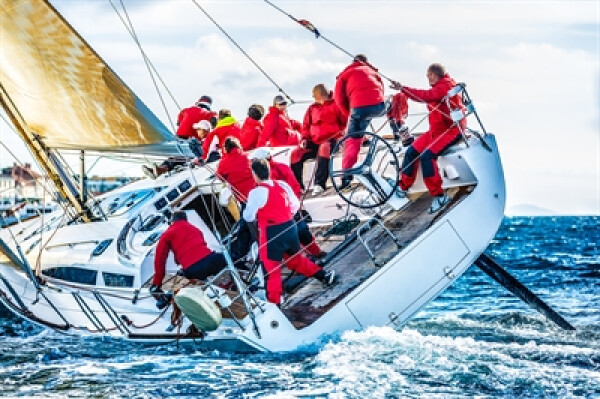
Finance on board: coordination between operations & supply chain and finance is essential
If you really want to achieve the goals you’ve set for yourself and realize the very best possible long-term improvements for your firm, then coordination between operations & supply chain on the one hand and your finance department on the other is essential. ARV Associate Pauline Kloeze summarizes it succinctly with a compelling appeal: make sure you have “finance on board”. That coordination across functional lines serves as the foundation for achieving growth ambitions or creating a leaner organization in a responsible manner. The results can be, among other things, optimization of working capital, the right investment decisions, optimal cost controls, and better cash flow management.

Five challenges in 2024 on the roller coaster called production
2024 is only a month old. And already one thing is certain. For production companies, this is the year of action and adventure. Call it a roller coaster, including global unrest, innovative tech developments, social issues and other challenges. Such a roller coaster is exciting and has unexpected twists, but it certainly also offers new business opportunities. Get in! Then we take a ride together with lightning-fast turns and dizzying loops along the top five challenges for 2024.

Five challenges in 2024 on the roller coaster called production
2024 is only a month old. And already one thing is certain. For production companies, this is the year of action and adventure. Call it a roller coaster, including global unrest, innovative tech developments, social issues and other challenges. Such a roller coaster is exciting and has unexpected twists, but it certainly also offers new business opportunities. Get in! Then we take a ride together with lightning-fast turns and dizzying loops along the top five challenges for 2024.

Five challenges in 2024 on the roller coaster called production
2024 is only a month old. And already one thing is certain. For production companies, this is the year of action and adventure. Call it a roller coaster, including global unrest, innovative tech developments, social issues and other challenges. Such a roller coaster is exciting and has unexpected twists, but it certainly also offers new business opportunities. Get in! Then we take a ride together with lightning-fast turns and dizzying loops along the top five challenges for 2024.

From Sales versus Operations to Sales & Operations
Tension between Sales and Operations is a familiar phenomenon about which much has been said and written. But when it comes to this subject, it’s still worthwhile to share experiences and inspire each other. And so we recently organized an Experience Workshop on the topic. There was plenty of sparring and debate, as well as consideration of where interests clash and how things could be improved. An inspiring gathering for the experienced participants and for us as well.
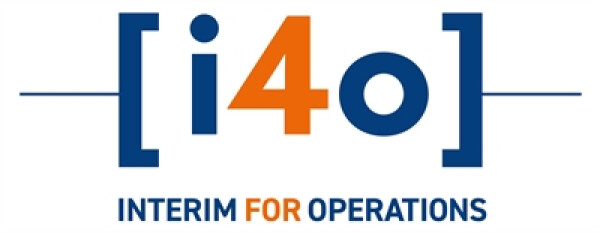
i4o: meeting the demand for interim management in operations
ARV Group introduces i4o: interim for operations. As Bartelt Blankenberg explains in his most recent blog, "i4o is a logical step in the expansion of our services for the process industry, based on the most important market trends and developments. It's our way of responding to the growing demand for interim management in operations.

Improving succesfully? Make bold choices, organize in the right way and take small steps
A new year is already underway. It is usually the period in which new opportunities are mapped out and new plans are made. On the road to improvement, change and progress. How do you avoid that well-known, disappointing conclusion in the evaluation at the end of this year? That although many things in your organization have been tackled with a lot of time and energy, objectives have not been reached and real results have not been achieved?
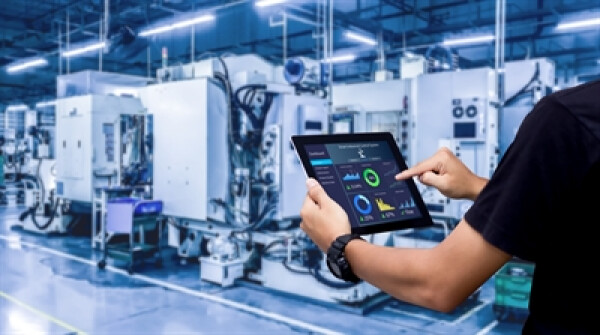
In search of a new balance between man and machine
In the process industry, technology is advancing at full speed. More and more production processes are being automated, creating highly technical machine parks. This does not alter the fact that the supply chain can sometimes be quite erratic. And therefore the need to be able to respond ad hoc to unexpected variations and nuances in the streamlined, almost automatically running production.

In search of a new balance between man and machine
In the process industry, technology is advancing at full speed. More and more production processes are being automated, creating highly technical machine parks. This does not alter the fact that the supply chain can sometimes be quite erratic. And therefore the need to be able to respond ad hoc to unexpected variations and nuances in the streamlined, almost automatically running production.

Operations and private equity: from prejudice to nuance and shared interests
What changes are in store for operations when a private equity party takes over the organization? Individuals from both sides talked about this during one of ARV Group's Experience Workshops. In his blog, Roelant van Herwaarden looks back on a successful workshop, during which prejudices made way for nuance and mutual understanding: investor, owner or manager, the interests are virtually always the same.

Organizational development: Putting together the entire puzzle
When we recently conducted our Experience Workshop, there was little disagreement among the participants on the do's and don'ts of organizational development. So if it seems so obvious, why is it that change and improvement processes in organizations do not always lead to the hoped for success? It was an afternoon with lively discussions and familiar dilemmas. Arianne van Tongeren of Ontwikkelingspartners and Bartelt Blankenberg recall the workshop in their most recent blog.

Organizational development: Putting together the entire puzzle
When we recently conducted our Experience Workshop, there was little disagreement among the participants on the do's and don'ts of organizational development. So if it seems so obvious, why is it that change and improvement processes in organizations do not always lead to the hoped for success? It was an afternoon with lively discussions and familiar dilemmas. Arianne van Tongeren of Ontwikkelingspartners and Bartelt Blankenberg recall the workshop in their most recent blog.

Organizational development: Putting together the entire puzzle
When we recently conducted our Experience Workshop, there was little disagreement among the participants on the do's and don'ts of organizational development. So if it seems so obvious, why is it that change and improvement processes in organizations do not always lead to the hoped for success? It was an afternoon with lively discussions and familiar dilemmas. Arianne van Tongeren of Ontwikkelingspartners and Bartelt Blankenberg recall the workshop in their most recent blog.

Smart MES is the basis for better performance and continuous improvement
A Manufacturing Execution System (MES) usually serves only as the bridge between planning (the ERP system) and process-control. Even though an MES can also act as the sole, “pure” information platform. Companies that see to the careful and well-thought-out development and implementation of their MES, Frank Bekkers says, are therefore laying the foundation for better performance and continuous improvement. Read about it in his blog.

Supply Chain Management: First the common objective, then the team spirit, and then the tool
Every process and every activity in the supply chain is triggered by customer demand. If you are to provide the best possible service to the customer at all times, and still achieve the organizational goals you aspire to, you need an extremely efficiently organized and precisely synchronized series of processes and activities. It only makes sense that businesses working in the process industry — whether they are large or small — will focus on optimizing the supply chain. But where do you begin? Just what approach should you take? And what are the pitfalls? ARV Group partner Stephan Verboom provides some insights in his new blog.

Supply Chain Management: First the common objective, then the team spirit, and then the tool
Every process and every activity in the supply chain is triggered by customer demand. If you are to provide the best possible service to the customer at all times, and still achieve the organizational goals you aspire to, you need an extremely efficiently organized and precisely synchronized series of processes and activities. It only makes sense that businesses working in the process industry — whether they are large or small — will focus on optimizing the supply chain. But where do you begin? Just what approach should you take? And what are the pitfalls? ARV Group partner Stephan Verboom provides some insights in his new blog.

Sustainability: prevent a many-headed monster within the total supply chain
Companies in the process industry are active on many fronts when it comes to sustainability. Reduce energy consumption, use renewable energy sources, reduce footprint. The demand for sustainable products and packaging is also increasing, while at the same time legislation and customer requirements are becoming increasingly strict.

The challenge of fresh food production: applying Formula 1 precision to the food industry
Knowing what you are supposed to deliver. Fully focused on unexpected twists and turns along the way. Giving just a little more gas, or tapping on the brakes. Shifting gears in an instant, adjusting your course, and then full speed ahead. In the world of fresh food production, every day is a bit like a Formula 1 race. According to ARV Group Partner Ronald Visser, it's hard to imagine it could be any more hectic or dynamic.

The challenge of fresh food production: applying Formula 1 precision to the food industry
Knowing what you are supposed to deliver. Fully focused on unexpected twists and turns along the way. Giving just a little more gas, or tapping on the brakes. Shifting gears in an instant, adjusting your course, and then full speed ahead. In the world of fresh food production, every day is a bit like a Formula 1 race. According to ARV Group Partner Ronald Visser, it's hard to imagine it could be any more hectic or dynamic.

The challenge of fresh food production: applying Formula 1 precision to the food industry
Knowing what you are supposed to deliver. Fully focused on unexpected twists and turns along the way. Giving just a little more gas, or tapping on the brakes. Shifting gears in an instant, adjusting your course, and then full speed ahead. In the world of fresh food production, every day is a bit like a Formula 1 race. According to ARV Group Partner Ronald Visser, it's hard to imagine it could be any more hectic or dynamic.

The hidden power of usefulness, necessity and pleasure
Martijn Cazemier is convinced of it: entrepreneurial targets and personal ambitions reinforce each other when a sense of usefulness is the common drive. Because both companies and individuals want to do things that make a difference. His premise is that as long as change, improvement and growth are worth doing, everyone will feel like making them happen. And, with that, the door is open to success, growth and satisfied customers. Read his blog about the hidden power of usefulness, necessity and pleasure.

The road from unexpected downtime to preventive maintenance
Once you start down the path towards preventive maintenance, you'll find great opportunities and encouraging prospects for the future. Senior Consultant Ted Abrahamsen of ARV Group explains what you need to do to make the transition from putting out fires to implementing a preventive maintenance system.

The road from unexpected downtime to preventive maintenance
Once you start down the path towards preventive maintenance, you'll find great opportunities and encouraging prospects for the future. Senior Consultant Ted Abrahamsen of ARV Group explains what you need to do to make the transition from putting out fires to implementing a preventive maintenance system.

The search for effective relief from growing pains in operations
ARV Group recently organized an "Experience Workshop" for a group of twenty participants including operations directors, supply chain directors and plant managers. The theme: Growing pains in the wake of an economic boom. The provocative questions raised during the session: Why do they arise and what are the consequences for operations? And what can you do about them? The participants compared their experiences and shared valuable insights during a collective exploration of the possible approaches and solutions.
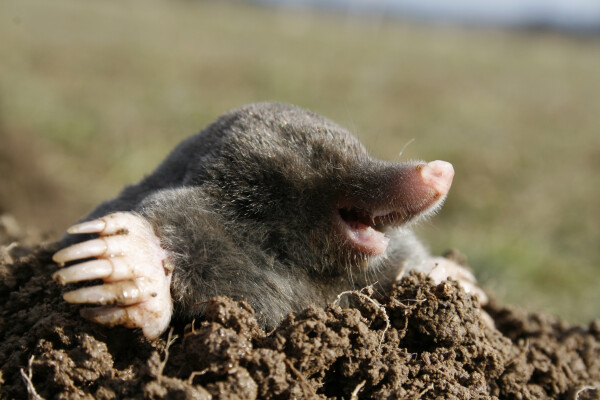
Avoid a mole game, almost every incident is a structurally solvable problem
Incidents can significantly disrupt the flow in the operations and supply chain. These are challenges that are usually solved with ad-hoc responses, trickery and temporarily sticking a band-aid here and there. But if you go for a thorough 'route cause analysis', information exchange in the entire chain, scenario thinking, a solid strategy and clear choices, then, according to Bastiaan Boers, you can prevent a mole game and be ahead of future incidents. This turns incidents into a structurally solvable problem.

Avoid a mole game, almost every incident is a structurally solvable problem
Incidents can significantly disrupt the flow in the operations and supply chain. These are challenges that are usually solved with ad-hoc responses, trickery and temporarily sticking a band-aid here and there. But if you go for a thorough 'route cause analysis', information exchange in the entire chain, scenario thinking, a solid strategy and clear choices, then, according to Bastiaan Boers, you can prevent a mole game and be ahead of future incidents. This turns incidents into a structurally solvable problem.

The best changes come about through trial, error, learning and moving on
Change. Every organization does it, everyone has to deal with it. Because developments inside and outside demand it. And because standing still - in the process industry also literally - means going backwards. In his blog, Principal Consultant Jan-Pieter Kuipers discusses what he considers to be essential success factors for change processes in the operations & supply chain.

You can't do anything alone, you have to do it together
True top sport is practiced in the supply chains of the manufacturing industry. The ball is played in an extremely dynamic manner from back to front throughout the entire organization. Improvements can be made and new successes can be achieved again and again between players and links. It requires a clear and widely supported view of the game and real team spirit. This also applies to the relationship between a consultant and the client organization. Because as Johan Cruijff once said: 'You can't do anything alone, you have to do it together'.

You can't do anything alone, you have to do it together
True top sport is practiced in the supply chains of the manufacturing industry. The ball is played in an extremely dynamic manner from back to front throughout the entire organization. Improvements can be made and new successes can be achieved again and again between players and links. It requires a clear and widely supported view of the game and real team spirit. This also applies to the relationship between a consultant and the client organization. Because as Johan Cruijff once said: 'You can't do anything alone, you have to do it together'.

You can't do anything alone, you have to do it together
True top sport is practiced in the supply chains of the manufacturing industry. The ball is played in an extremely dynamic manner from back to front throughout the entire organization. Improvements can be made and new successes can be achieved again and again between players and links. It requires a clear and widely supported view of the game and real team spirit. This also applies to the relationship between a consultant and the client organization. Because as Johan Cruijff once said: 'You can't do anything alone, you have to do it together'.

Are you, as a food company, ready for the digital transformation?
Is your company constantly lagging behind the new questions, desires, and developments from the market and society? Then it’s time for digital transformation. This allows you to benefit from digital tools, the predictive power of data, digitized processes, automated routine work, and optimal transparency. It creates room to grow and to respond effectively to new demands and changes in the market. Marcel Aardenburg outlines the opportunities in his blog. He also offers a handy, free handout, ‘Five Essential Tips for Digital Transformation in the Food Industry’, full of practical steps and useful insights.

Are you, as a food company, ready for the digital transformation?
Is your company constantly lagging behind the new questions, desires, and developments from the market and society? Then it’s time for digital transformation. This allows you to benefit from digital tools, the predictive power of data, digitized processes, automated routine work, and optimal transparency. It creates room to grow and to respond effectively to new demands and changes in the market. Marcel Aardenburg outlines the opportunities in his blog. He also offers a handy, free handout, ‘Five Essential Tips for Digital Transformation in the Food Industry’, full of practical steps and useful insights.

The success of automation is determined by new, optimal collaboration between humans and technology
How do you ensure that, in automation, the interests of all involved stakeholders and teams are aligned? How can engineering and operations achieve fruitful collaboration? And how do you make sure that new technology truly works for the people who ultimately have to use it? Jan-Pieter Kuipers is fascinated by these questions and explores them further in his blog.

How curious do you dare to be?
How curious do you dare to be? That’s the question Arianne van Tongeren from Ontwikkelingspartners asks in her blog. Do you dare to openly question each other? And to look at yourself through the eyes of another? By doing so, you truly begin to see, sense, and appreciate each other. This allows you to break through existing blockades, impasses, and frustrating patterns together, and try out groundbreaking innovative ideas. It can bring about wonderful things. In your personal life, and in the organization and teams you work with.

How curious do you dare to be?
How curious do you dare to be? That’s the question Arianne van Tongeren from Ontwikkelingspartners asks in her blog. Do you dare to openly question each other? And to look at yourself through the eyes of another? By doing so, you truly begin to see, sense, and appreciate each other. This allows you to break through existing blockades, impasses, and frustrating patterns together, and try out groundbreaking innovative ideas. It can bring about wonderful things. In your personal life, and in the organization and teams you work with.

How curious do you dare to be?
How curious do you dare to be? That’s the question Arianne van Tongeren from Ontwikkelingspartners asks in her blog. Do you dare to openly question each other? And to look at yourself through the eyes of another? By doing so, you truly begin to see, sense, and appreciate each other. This allows you to break through existing blockades, impasses, and frustrating patterns together, and try out groundbreaking innovative ideas. It can bring about wonderful things. In your personal life, and in the organization and teams you work with.

Consider how to allocate roles between your own people and hired capacity
In the process industry, there is often a need for temporary capacity at the executive level. Hiring hands-on operations professionals on a secondment basis is a frequently chosen solution. It is important to determine in advance which roles they will temporarily fulfill within the organization. Will the seconded professional work on a project or improvement initiative? Or will you free up your own people for that and ensure the seconded professional keeps the daily operations running smoothly?

Isn't the QA department gradually developing hydrocephalus?
Do you allow the staffing of your QA department to grow in order to keep up with continuous tightening of legislation and regulations and customer requirements? Or do you opt for the quality that you as a company strive for, do you ensure that quality becomes a self-evident part of daily work and thus keep your QA department compact? Lisette Holst writes about it in her blog.

Isn't the QA department gradually developing hydrocephalus?
Do you allow the staffing of your QA department to grow in order to keep up with continuous tightening of legislation and regulations and customer requirements? Or do you opt for the quality that you as a company strive for, do you ensure that quality becomes a self-evident part of daily work and thus keep your QA department compact? Lisette Holst writes about it in her blog.
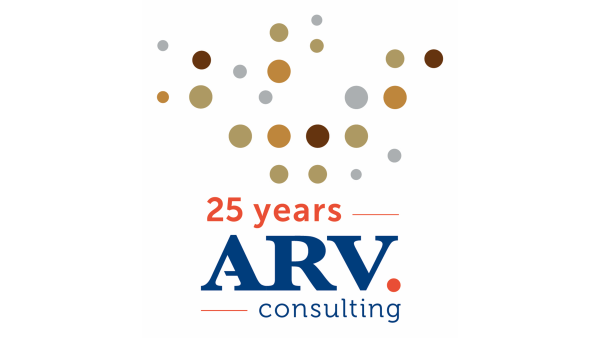
Service-oriented adaptability to increasingly frequent unexpected developments
These are dynamic times for companies in the process industry, with geopolitical tensions, macroeconomic consequences, and the rise of new technologies. This requires both production companies and external partners like ARV Group to adapt flexibly. Bartelt Blankenberg kicks off the new year with this topic in his latest blog.

Prevent a one-size-fits-all approach in the supply chain
With a one-size-fits-all supply chain, you can almost effortlessly serve your largest, most valuable customer group, while also catering to other product flows. But what happens when the happy flow starts to falter as new circumstances, different customers, and new market demands arise? Does that sound familiar? Bastiaan Boers helps guide you towards a structural solution in his blog.

Prevent a one-size-fits-all approach in the supply chain
With a one-size-fits-all supply chain, you can almost effortlessly serve your largest, most valuable customer group, while also catering to other product flows. But what happens when the happy flow starts to falter as new circumstances, different customers, and new market demands arise? Does that sound familiar? Bastiaan Boers helps guide you towards a structural solution in his blog.

Prevent a one-size-fits-all approach in the supply chain
With a one-size-fits-all supply chain, you can almost effortlessly serve your largest, most valuable customer group, while also catering to other product flows. But what happens when the happy flow starts to falter as new circumstances, different customers, and new market demands arise? Does that sound familiar? Bastiaan Boers helps guide you towards a structural solution in his blog.
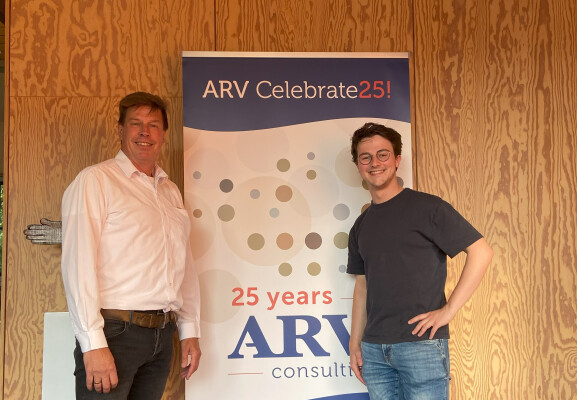
25 years of ARV Group: Ted & Matthias
One was there from the beginning, the other brings the future.
This year, ARV Group celebrates its 25th anniversary. To mark the occasion, a conversation with two colleagues: Ted Abrahamsen, senior consultant at ARV Consulting, who has been with the company since its inception, and Matthias Petri, who has been working as a consultant at XTR Operations for over two years.

Day meeting? Weekly meeting? Totally different and … each with its own function
Recognizable phenomenon? The weekly meeting is not used for its intended purpose but is disrupted by revisiting daily issues. While the day meeting is meant for that. How do you ensure a good structure focused on structural improvement?

Day meeting? Weekly meeting? Totally different and … each with its own function
Recognizable phenomenon? The weekly meeting is not used for its intended purpose but is disrupted by revisiting daily issues. While the day meeting is meant for that. How do you ensure a good structure focused on structural improvement?
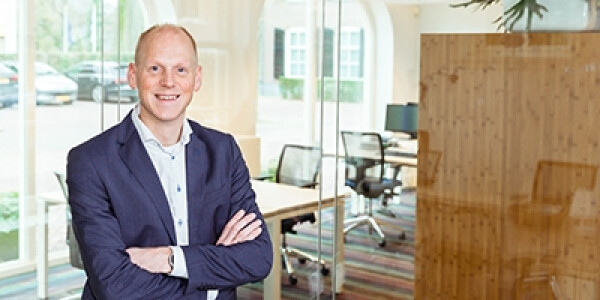
We are pleased to introduce to you: Erik Petter
"When a company is faced with an enormous challenge, that gives me energy. Making good use of an organization's potential is one of the things I do best: developing people and teams and working together in such a way that durable results are achieved."
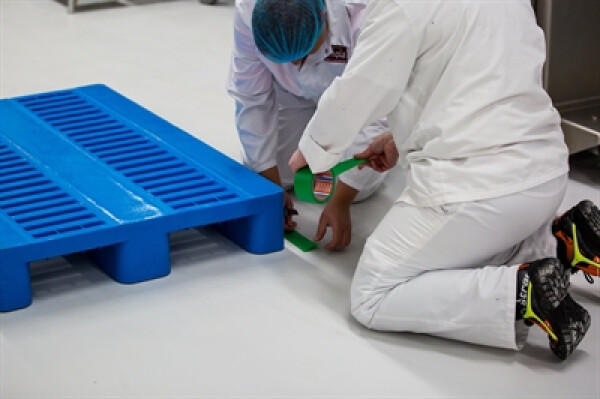
Mola opts for structured growth and 5S
Mola B.V. delivers hundreds of thousands of products to customers every single day from its modern production facility in the North Brabant town of Beugen. From puff pastry products and croissants to Danish pastries. And demand continues to grow. After management, in cooperation with ARV, had worked out a growth strategy and created the organization to pursue the strategy, it implemented 5S on its production lines. Production manager William Kums and quality officer Renske van de Lockant reflect on the 5S project.

CI-Community workshop
CI-facilitators from a number of food companies meet regularly at ARV Group’s invitation, to share their knowledge and experiences in the field of Change Management and Continuous Improvement. On Thursday, March 8, 2018, the members of this CI-Community applied themselves to the question: “How and when does one apply interactive working formats in the course of change processes?” Here you can read about how they inspired each other in their exploration of this fascinating and challenging theme.
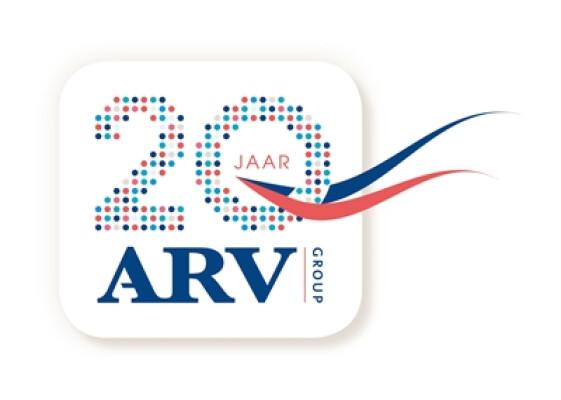
ARV Group celebrates its 20th anniversary!
This year ARV is celebrating its 20th anniversary. These past 20 years have been years of continuous development and growth. For the companies that we serve, and for ourselves as well. We feel ourselves enriched by the opportunity to work with such an inspiring group of clients as well as a faithful team of highly skilled professionals who deliver to our clients and are constantly keeping each other on the ball. The result is that we’ve been able to constantly broaden our horizons. For the last 20 years. This year as well. And for the next 20 years.
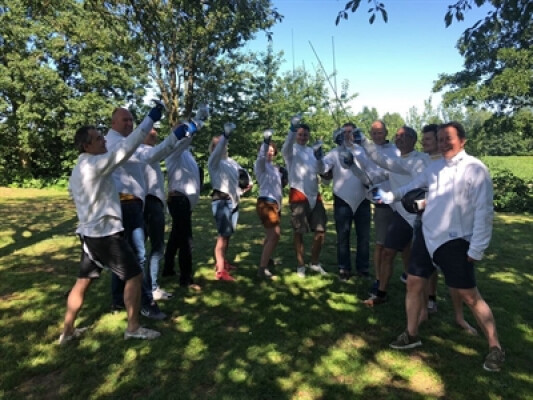
ARV Group outing
The annual ARV outing with the whole team was held this year on Friday, June 29, 2018. This year we took part in a clinic and duel fending course, held in the gardens of mediaeval Doddendael Castle in the eastern Netherlands. Click here for a photographic impression of our fanatical team of fencers!

ARV Group outing
The annual ARV outing with the whole team was held this year on Friday, June 29, 2018. This year we took part in a clinic and duel fending course, held in the gardens of mediaeval Doddendael Castle in the eastern Netherlands. Click here for a photographic impression of our fanatical team of fencers!

Bringing responsibilities to the right organizational level requires a balance between WHAT and HOW
What makes you, as a manager, able to bring responsibilities to the right level in the organization? How do you create a sense of responsibility among team leaders and their teams? And how do you provide guidance without being in the driver's seat in terms of content, practicality and process? The answers are hidden in the optimal balance between the WHAT and the HOW: joint commitment about the desired end result, space and ownership to determine the route to it yourself.

Bringing responsibilities to the right organizational level requires a balance between WHAT and HOW
What makes you, as a manager, able to bring responsibilities to the right level in the organization? How do you create a sense of responsibility among team leaders and their teams? And how do you provide guidance without being in the driver's seat in terms of content, practicality and process? The answers are hidden in the optimal balance between the WHAT and the HOW: joint commitment about the desired end result, space and ownership to determine the route to it yourself.

Direct personnel planning every bit as important as OEE
The goal of Overall Equipment Effectiveness (OEE) is to achieve optimal productivity on a production line. But aren’t we focusing too exclusively on the process, the technology and the machines alone? Erik Haks (Associate Partner ARV Group) is convinced that productivity and quality will receive a much bigger boost when direct personnel planning is applied. Read his blog about establishing systematic planning for in-house personnel and flexi-workers and their capabilities. Allotting enough capacity to production lines. And mobilizing and developing all of the required know-how and skills.

Embrace disagreements: if it rubs, your organization will shine
Disagreements are everywhere. In life. In our society. And also in organizations. By nature, people tend to want to eliminate contradictions. Because they are often seen as 'hassle'. But are disagreements in your organization really undesirable? If you look further, you will discover that they are a rich breeding ground for joint success.

Embrace disagreements: if it rubs, your organization will shine
Disagreements are everywhere. In life. In our society. And also in organizations. By nature, people tend to want to eliminate contradictions. Because they are often seen as 'hassle'. But are disagreements in your organization really undesirable? If you look further, you will discover that they are a rich breeding ground for joint success.

Finance on board: coordination between operations & supply chain and finance is essential
If you really want to achieve the goals you’ve set for yourself and realize the very best possible long-term improvements for your firm, then coordination between operations & supply chain on the one hand and your finance department on the other is essential. ARV Associate Pauline Kloeze summarizes it succinctly with a compelling appeal: make sure you have “finance on board”. That coordination across functional lines serves as the foundation for achieving growth ambitions or creating a leaner organization in a responsible manner. The results can be, among other things, optimization of working capital, the right investment decisions, optimal cost controls, and better cash flow management.

From Sales versus Operations to Sales & Operations
Tension between Sales and Operations is a familiar phenomenon about which much has been said and written. But when it comes to this subject, it’s still worthwhile to share experiences and inspire each other. And so we recently organized an Experience Workshop on the topic. There was plenty of sparring and debate, as well as consideration of where interests clash and how things could be improved. An inspiring gathering for the experienced participants and for us as well.

From Sales versus Operations to Sales & Operations
Tension between Sales and Operations is a familiar phenomenon about which much has been said and written. But when it comes to this subject, it’s still worthwhile to share experiences and inspire each other. And so we recently organized an Experience Workshop on the topic. There was plenty of sparring and debate, as well as consideration of where interests clash and how things could be improved. An inspiring gathering for the experienced participants and for us as well.

i4o: meeting the demand for interim management in operations
ARV Group introduces i4o: interim for operations. As Bartelt Blankenberg explains in his most recent blog, "i4o is a logical step in the expansion of our services for the process industry, based on the most important market trends and developments. It's our way of responding to the growing demand for interim management in operations.

Improving succesfully? Make bold choices, organize in the right way and take small steps
A new year is already underway. It is usually the period in which new opportunities are mapped out and new plans are made. On the road to improvement, change and progress. How do you avoid that well-known, disappointing conclusion in the evaluation at the end of this year? That although many things in your organization have been tackled with a lot of time and energy, objectives have not been reached and real results have not been achieved?

Improving succesfully? Make bold choices, organize in the right way and take small steps
A new year is already underway. It is usually the period in which new opportunities are mapped out and new plans are made. On the road to improvement, change and progress. How do you avoid that well-known, disappointing conclusion in the evaluation at the end of this year? That although many things in your organization have been tackled with a lot of time and energy, objectives have not been reached and real results have not been achieved?

Operations and private equity: from prejudice to nuance and shared interests
What changes are in store for operations when a private equity party takes over the organization? Individuals from both sides talked about this during one of ARV Group's Experience Workshops. In his blog, Roelant van Herwaarden looks back on a successful workshop, during which prejudices made way for nuance and mutual understanding: investor, owner or manager, the interests are virtually always the same.

Smart MES is the basis for better performance and continuous improvement
A Manufacturing Execution System (MES) usually serves only as the bridge between planning (the ERP system) and process-control. Even though an MES can also act as the sole, “pure” information platform. Companies that see to the careful and well-thought-out development and implementation of their MES, Frank Bekkers says, are therefore laying the foundation for better performance and continuous improvement. Read about it in his blog.

Smart MES is the basis for better performance and continuous improvement
A Manufacturing Execution System (MES) usually serves only as the bridge between planning (the ERP system) and process-control. Even though an MES can also act as the sole, “pure” information platform. Companies that see to the careful and well-thought-out development and implementation of their MES, Frank Bekkers says, are therefore laying the foundation for better performance and continuous improvement. Read about it in his blog.

Sustainability: prevent a many-headed monster within the total supply chain
Companies in the process industry are active on many fronts when it comes to sustainability. Reduce energy consumption, use renewable energy sources, reduce footprint. The demand for sustainable products and packaging is also increasing, while at the same time legislation and customer requirements are becoming increasingly strict.

The hidden power of usefulness, necessity and pleasure
Martijn Cazemier is convinced of it: entrepreneurial targets and personal ambitions reinforce each other when a sense of usefulness is the common drive. Because both companies and individuals want to do things that make a difference. His premise is that as long as change, improvement and growth are worth doing, everyone will feel like making them happen. And, with that, the door is open to success, growth and satisfied customers. Read his blog about the hidden power of usefulness, necessity and pleasure.

The hidden power of usefulness, necessity and pleasure
Martijn Cazemier is convinced of it: entrepreneurial targets and personal ambitions reinforce each other when a sense of usefulness is the common drive. Because both companies and individuals want to do things that make a difference. His premise is that as long as change, improvement and growth are worth doing, everyone will feel like making them happen. And, with that, the door is open to success, growth and satisfied customers. Read his blog about the hidden power of usefulness, necessity and pleasure.

The search for effective relief from growing pains in operations
ARV Group recently organized an "Experience Workshop" for a group of twenty participants including operations directors, supply chain directors and plant managers. The theme: Growing pains in the wake of an economic boom. The provocative questions raised during the session: Why do they arise and what are the consequences for operations? And what can you do about them? The participants compared their experiences and shared valuable insights during a collective exploration of the possible approaches and solutions.

The best changes come about through trial, error, learning and moving on
Change. Every organization does it, everyone has to deal with it. Because developments inside and outside demand it. And because standing still - in the process industry also literally - means going backwards. In his blog, Principal Consultant Jan-Pieter Kuipers discusses what he considers to be essential success factors for change processes in the operations & supply chain.

The success of automation is determined by new, optimal collaboration between humans and technology
How do you ensure that, in automation, the interests of all involved stakeholders and teams are aligned? How can engineering and operations achieve fruitful collaboration? And how do you make sure that new technology truly works for the people who ultimately have to use it? Jan-Pieter Kuipers is fascinated by these questions and explores them further in his blog.

Consider how to allocate roles between your own people and hired capacity
In the process industry, there is often a need for temporary capacity at the executive level. Hiring hands-on operations professionals on a secondment basis is a frequently chosen solution. It is important to determine in advance which roles they will temporarily fulfill within the organization. Will the seconded professional work on a project or improvement initiative? Or will you free up your own people for that and ensure the seconded professional keeps the daily operations running smoothly?

Consider how to allocate roles between your own people and hired capacity
In the process industry, there is often a need for temporary capacity at the executive level. Hiring hands-on operations professionals on a secondment basis is a frequently chosen solution. It is important to determine in advance which roles they will temporarily fulfill within the organization. Will the seconded professional work on a project or improvement initiative? Or will you free up your own people for that and ensure the seconded professional keeps the daily operations running smoothly?

Service-oriented adaptability to increasingly frequent unexpected developments
These are dynamic times for companies in the process industry, with geopolitical tensions, macroeconomic consequences, and the rise of new technologies. This requires both production companies and external partners like ARV Group to adapt flexibly. Bartelt Blankenberg kicks off the new year with this topic in his latest blog.

25 years of ARV Group: Ted & Matthias
One was there from the beginning, the other brings the future.
This year, ARV Group celebrates its 25th anniversary. To mark the occasion, a conversation with two colleagues: Ted Abrahamsen, senior consultant at ARV Consulting, who has been with the company since its inception, and Matthias Petri, who has been working as a consultant at XTR Operations for over two years.

25 years of ARV Group: Ted & Matthias
One was there from the beginning, the other brings the future.
This year, ARV Group celebrates its 25th anniversary. To mark the occasion, a conversation with two colleagues: Ted Abrahamsen, senior consultant at ARV Consulting, who has been with the company since its inception, and Matthias Petri, who has been working as a consultant at XTR Operations for over two years.

We are pleased to introduce to you: Erik Petter
"When a company is faced with an enormous challenge, that gives me energy. Making good use of an organization's potential is one of the things I do best: developing people and teams and working together in such a way that durable results are achieved."

We are pleased to introduce to you: Erik Petter
"When a company is faced with an enormous challenge, that gives me energy. Making good use of an organization's potential is one of the things I do best: developing people and teams and working together in such a way that durable results are achieved."

Mola opts for structured growth and 5S
Mola B.V. delivers hundreds of thousands of products to customers every single day from its modern production facility in the North Brabant town of Beugen. From puff pastry products and croissants to Danish pastries. And demand continues to grow. After management, in cooperation with ARV, had worked out a growth strategy and created the organization to pursue the strategy, it implemented 5S on its production lines. Production manager William Kums and quality officer Renske van de Lockant reflect on the 5S project.

Mola opts for structured growth and 5S
Mola B.V. delivers hundreds of thousands of products to customers every single day from its modern production facility in the North Brabant town of Beugen. From puff pastry products and croissants to Danish pastries. And demand continues to grow. After management, in cooperation with ARV, had worked out a growth strategy and created the organization to pursue the strategy, it implemented 5S on its production lines. Production manager William Kums and quality officer Renske van de Lockant reflect on the 5S project.

CI-Community workshop
CI-facilitators from a number of food companies meet regularly at ARV Group’s invitation, to share their knowledge and experiences in the field of Change Management and Continuous Improvement. On Thursday, March 8, 2018, the members of this CI-Community applied themselves to the question: “How and when does one apply interactive working formats in the course of change processes?” Here you can read about how they inspired each other in their exploration of this fascinating and challenging theme.

ARV Group celebrates its 20th anniversary!
This year ARV is celebrating its 20th anniversary. These past 20 years have been years of continuous development and growth. For the companies that we serve, and for ourselves as well. We feel ourselves enriched by the opportunity to work with such an inspiring group of clients as well as a faithful team of highly skilled professionals who deliver to our clients and are constantly keeping each other on the ball. The result is that we’ve been able to constantly broaden our horizons. For the last 20 years. This year as well. And for the next 20 years.

ARV Group celebrates its 20th anniversary!
This year ARV is celebrating its 20th anniversary. These past 20 years have been years of continuous development and growth. For the companies that we serve, and for ourselves as well. We feel ourselves enriched by the opportunity to work with such an inspiring group of clients as well as a faithful team of highly skilled professionals who deliver to our clients and are constantly keeping each other on the ball. The result is that we’ve been able to constantly broaden our horizons. For the last 20 years. This year as well. And for the next 20 years.

Consultancy across borders
Want to get the shop floor involved in programs for change and improvement? Outside the Netherlands, the bottom-up approach is not always the gospel truth. In his blog, Edgar Scheffrahn shares years of practical experience in working abroad. As a consultant, studying the culture and establishing relationships in the right way is the key to success abroad.

Entrepreneurship: a road trip with fascinating experiences and inspiring travel companions
The holidays are coming up again. Where one chooses a relaxed, carefully planned holiday in a pre-booked place, the other opts for adventure without a day-to-day mapped route, destination unknown. The latter way of travelling requires entrepreneurship and reminds me of the road trip we have taken as ARV Group to date.

In search of a new balance between man and machine
In the process industry, technology is advancing at full speed. More and more production processes are being automated, creating highly technical machine parks. This does not alter the fact that the supply chain can sometimes be quite erratic. And therefore the need to be able to respond ad hoc to unexpected variations and nuances in the streamlined, almost automatically running production.

Supply Chain Management: First the common objective, then the team spirit, and then the tool
Every process and every activity in the supply chain is triggered by customer demand. If you are to provide the best possible service to the customer at all times, and still achieve the organizational goals you aspire to, you need an extremely efficiently organized and precisely synchronized series of processes and activities. It only makes sense that businesses working in the process industry — whether they are large or small — will focus on optimizing the supply chain. But where do you begin? Just what approach should you take? And what are the pitfalls? ARV Group partner Stephan Verboom provides some insights in his new blog.

The road from unexpected downtime to preventive maintenance
Once you start down the path towards preventive maintenance, you'll find great opportunities and encouraging prospects for the future. Senior Consultant Ted Abrahamsen of ARV Group explains what you need to do to make the transition from putting out fires to implementing a preventive maintenance system.

Avoid a mole game, almost every incident is a structurally solvable problem
Incidents can significantly disrupt the flow in the operations and supply chain. These are challenges that are usually solved with ad-hoc responses, trickery and temporarily sticking a band-aid here and there. But if you go for a thorough 'route cause analysis', information exchange in the entire chain, scenario thinking, a solid strategy and clear choices, then, according to Bastiaan Boers, you can prevent a mole game and be ahead of future incidents. This turns incidents into a structurally solvable problem.

Are you, as a food company, ready for the digital transformation?
Is your company constantly lagging behind the new questions, desires, and developments from the market and society? Then it’s time for digital transformation. This allows you to benefit from digital tools, the predictive power of data, digitized processes, automated routine work, and optimal transparency. It creates room to grow and to respond effectively to new demands and changes in the market. Marcel Aardenburg outlines the opportunities in his blog. He also offers a handy, free handout, ‘Five Essential Tips for Digital Transformation in the Food Industry’, full of practical steps and useful insights.

Isn't the QA department gradually developing hydrocephalus?
Do you allow the staffing of your QA department to grow in order to keep up with continuous tightening of legislation and regulations and customer requirements? Or do you opt for the quality that you as a company strive for, do you ensure that quality becomes a self-evident part of daily work and thus keep your QA department compact? Lisette Holst writes about it in her blog.

Day meeting? Weekly meeting? Totally different and … each with its own function
Recognizable phenomenon? The weekly meeting is not used for its intended purpose but is disrupted by revisiting daily issues. While the day meeting is meant for that. How do you ensure a good structure focused on structural improvement?

ARV Group outing
The annual ARV outing with the whole team was held this year on Friday, June 29, 2018. This year we took part in a clinic and duel fending course, held in the gardens of mediaeval Doddendael Castle in the eastern Netherlands. Click here for a photographic impression of our fanatical team of fencers!

Direct personnel planning every bit as important as OEE
The goal of Overall Equipment Effectiveness (OEE) is to achieve optimal productivity on a production line. But aren’t we focusing too exclusively on the process, the technology and the machines alone? Erik Haks (Associate Partner ARV Group) is convinced that productivity and quality will receive a much bigger boost when direct personnel planning is applied. Read his blog about establishing systematic planning for in-house personnel and flexi-workers and their capabilities. Allotting enough capacity to production lines. And mobilizing and developing all of the required know-how and skills.

Finance on board: coordination between operations & supply chain and finance is essential
If you really want to achieve the goals you’ve set for yourself and realize the very best possible long-term improvements for your firm, then coordination between operations & supply chain on the one hand and your finance department on the other is essential. ARV Associate Pauline Kloeze summarizes it succinctly with a compelling appeal: make sure you have “finance on board”. That coordination across functional lines serves as the foundation for achieving growth ambitions or creating a leaner organization in a responsible manner. The results can be, among other things, optimization of working capital, the right investment decisions, optimal cost controls, and better cash flow management.

i4o: meeting the demand for interim management in operations
ARV Group introduces i4o: interim for operations. As Bartelt Blankenberg explains in his most recent blog, "i4o is a logical step in the expansion of our services for the process industry, based on the most important market trends and developments. It's our way of responding to the growing demand for interim management in operations.

Operations and private equity: from prejudice to nuance and shared interests
What changes are in store for operations when a private equity party takes over the organization? Individuals from both sides talked about this during one of ARV Group's Experience Workshops. In his blog, Roelant van Herwaarden looks back on a successful workshop, during which prejudices made way for nuance and mutual understanding: investor, owner or manager, the interests are virtually always the same.

Sustainability: prevent a many-headed monster within the total supply chain
Companies in the process industry are active on many fronts when it comes to sustainability. Reduce energy consumption, use renewable energy sources, reduce footprint. The demand for sustainable products and packaging is also increasing, while at the same time legislation and customer requirements are becoming increasingly strict.

The search for effective relief from growing pains in operations
ARV Group recently organized an "Experience Workshop" for a group of twenty participants including operations directors, supply chain directors and plant managers. The theme: Growing pains in the wake of an economic boom. The provocative questions raised during the session: Why do they arise and what are the consequences for operations? And what can you do about them? The participants compared their experiences and shared valuable insights during a collective exploration of the possible approaches and solutions.

The best changes come about through trial, error, learning and moving on
Change. Every organization does it, everyone has to deal with it. Because developments inside and outside demand it. And because standing still - in the process industry also literally - means going backwards. In his blog, Principal Consultant Jan-Pieter Kuipers discusses what he considers to be essential success factors for change processes in the operations & supply chain.

The success of automation is determined by new, optimal collaboration between humans and technology
How do you ensure that, in automation, the interests of all involved stakeholders and teams are aligned? How can engineering and operations achieve fruitful collaboration? And how do you make sure that new technology truly works for the people who ultimately have to use it? Jan-Pieter Kuipers is fascinated by these questions and explores them further in his blog.

Service-oriented adaptability to increasingly frequent unexpected developments
These are dynamic times for companies in the process industry, with geopolitical tensions, macroeconomic consequences, and the rise of new technologies. This requires both production companies and external partners like ARV Group to adapt flexibly. Bartelt Blankenberg kicks off the new year with this topic in his latest blog.

CI-Community workshop
CI-facilitators from a number of food companies meet regularly at ARV Group’s invitation, to share their knowledge and experiences in the field of Change Management and Continuous Improvement. On Thursday, March 8, 2018, the members of this CI-Community applied themselves to the question: “How and when does one apply interactive working formats in the course of change processes?” Here you can read about how they inspired each other in their exploration of this fascinating and challenging theme.
Fulfill growth ambitions or reduce costs?
Get to know the experience and expertise of ARV Consulting.
Part of www.arvgroup.com
Address
ARV Consulting
Infanteriestraat 120
6822 NJ Arnhem
VAT: NL808635360B01
KVK: 09110359
desk@arvgroup.com








